

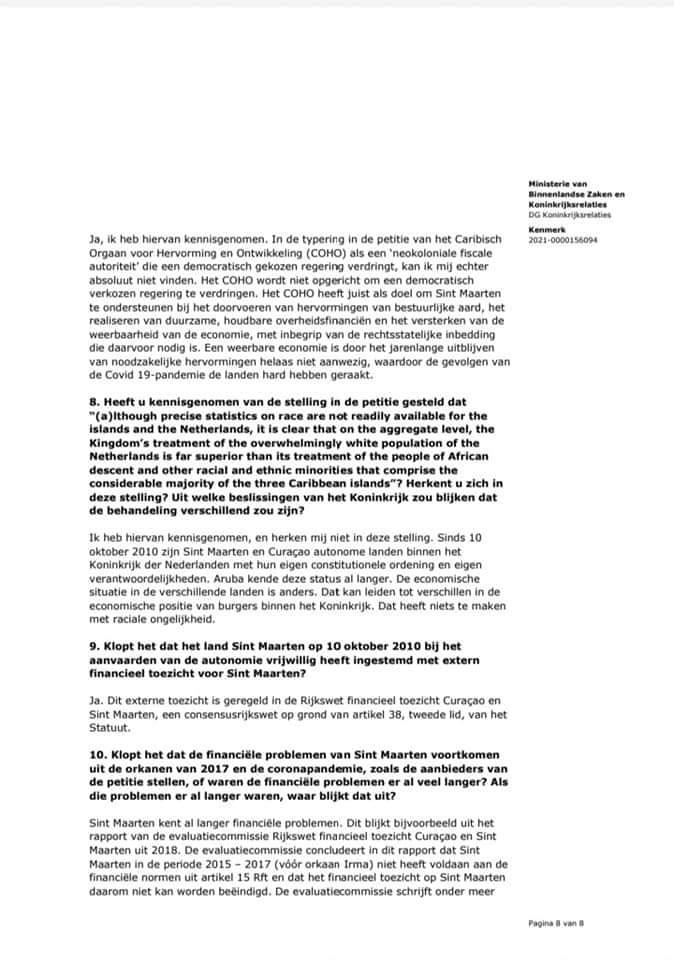
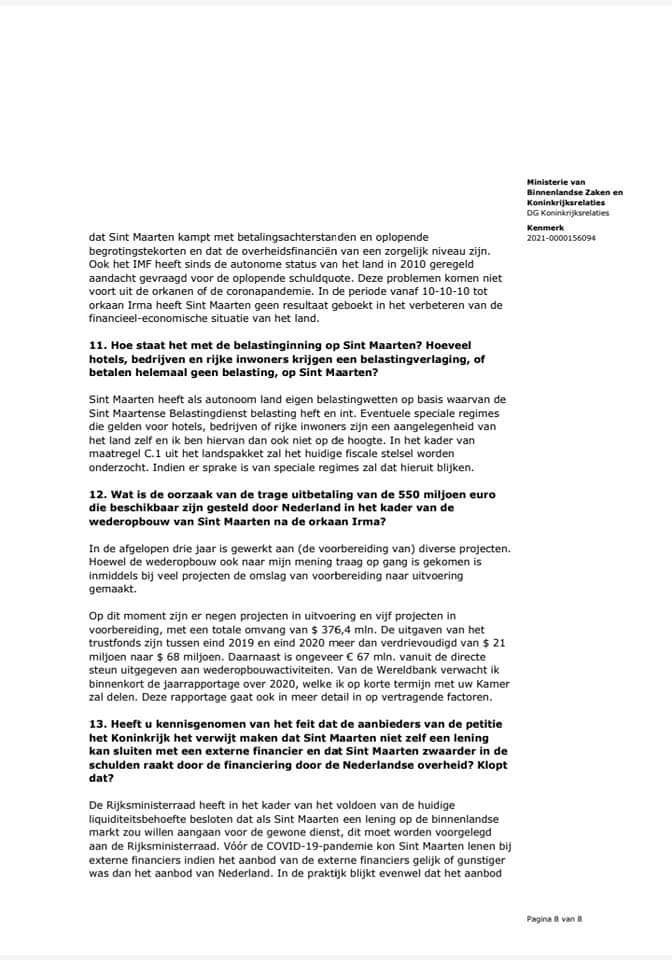
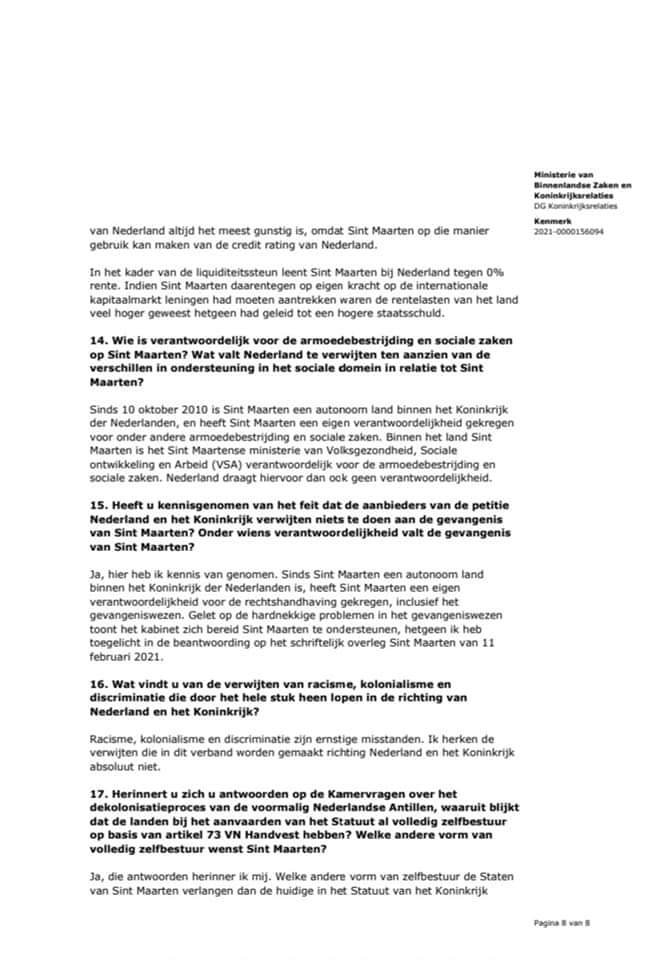

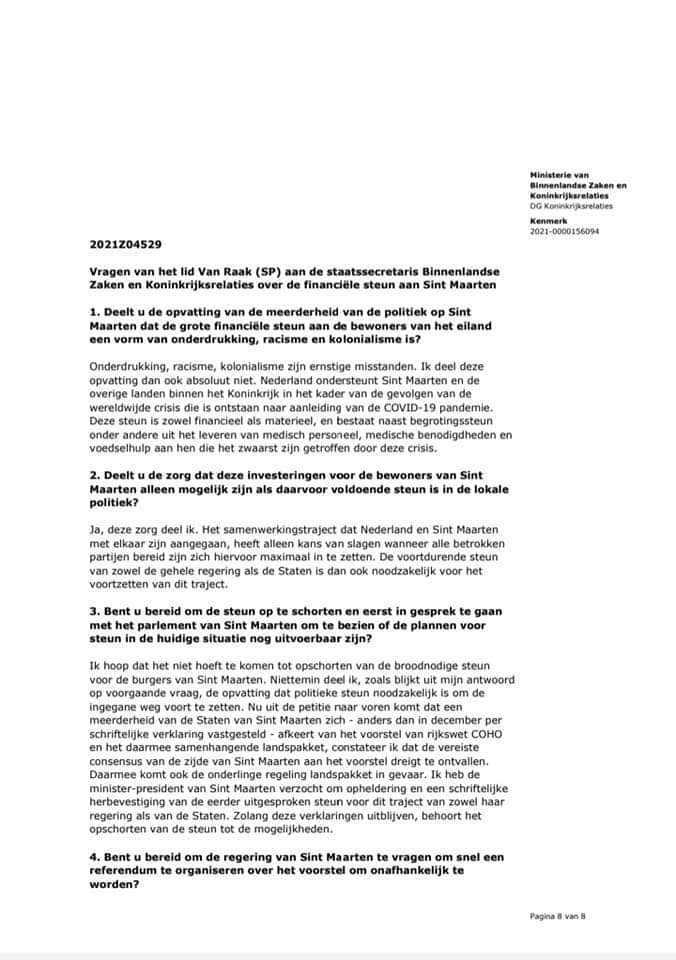
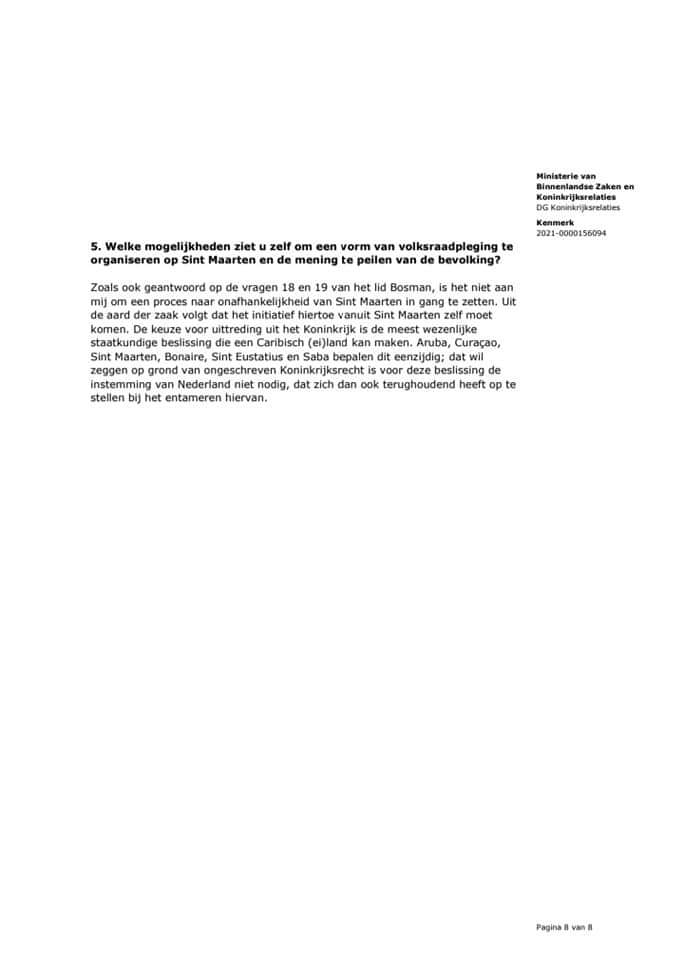
Answers to parliamentary questions about petition and financial support for Sint Maarten
State Secretary Knops answers questions about the petition from and financial support to Sint Maarten.
THE HAGUE Date March 18, 2021
Regards Answers to parliamentary questions I hereby offer you the answers to the written questions that have been asked by the member Bosman (VVD) about the petition of Sint Maarten and by the member Van Raak about the financial support to Sint Maarten.
Since both sets of written questions relate to a petition submitted to the United Nations by the States of Sint Maarten, I will answer these questions in one letter.
The questions were submitted on March 12, with reference 2021Z04516 and 2021Z04529.
Questions from the member Bosman (VVD) to the State Secretary of
Home Affairs and Kingdom Relations about the petition of Saint
Maarten
- Are you familiar with “PETITION PRESENTED TO: THE SPECIAL
RAPPORTEUR ON CONTEMPORARY FORMS OF RACISM, RACIAL
DISCRIMINATION, XENOPHOBIA AND RELATED INTOLERANCE AND THE
WORKING GROUP OF EXPERTS ON PEOPLE OF AFRICAN DESCENT ON EXCEPT OF THE PARLIAMENT AND CITIZENS OF SINT MAARTEN ”of 9 March 2021?
Yes.
- Is this petition also on behalf of Bonaire, Saba and Sint Eustatius?
No.
- Is this petition also on behalf of Aruba and Curaçao?
No.
- Has the accusation that “the Netherlands failed in its obligation to promote self-government” also been discussed in the Council of Ministers of the Kingdom? If so, when?
No.
- Have the above allegations been discussed in other consultations? If so, where?
This has not been discussed in meetings where I was present.
- Has the government of Sint Maarten expressed support for this petition? If so, when? If not, why not?
To my knowledge, the government of Sint Maarten has expressed no support for this petition. Whether or not she supports this petition is therefore unknown to me. I have requested clarification about this from the Prime Minister of Sint Maarten.
- Have you taken note of the fact that the petition speaks of “the ousting of a democratically elected government by a neo-colonial fiscal authority”? If so, does this displacement take place? If so, can you indicate where this displacement takes place?
Yes, I have read this. However, I absolutely do not agree with the petition of the Caribbean Body for Reform and Development (COHO) as a “neo-colonial fiscal authority” that is supplanting a democratically elected government. The COHO is not created to supplant a democratically elected government. The COHO specifically aims to support Sint Maarten in implementing reforms of an administrative nature, realizing sustainable, sustainable public finances and strengthening the resilience of the economy, including the rule of law embedding that is necessary for this. A resilient economy is unfortunately not available due to the years of lack of necessary reforms, as a result of which the consequences of the Covid 19 pandemic have hit the countries hard.
- Have you taken note of the statement in the petition that “(a) though precise statistics on race are not readily available for the islands and the Netherlands, it is clear that on the aggregate level, the Kingdom’s treatment of the overwhelmingly white population of the Netherlands is far superior than its treatment of the people of African descent and other racial and ethnic minorities that comprise the considerable majority of the three Caribbean islands ”? Do you recognize yourself in this statement? What decisions by the Kingdom would indicate that treatment would be different?
I have taken note of this and do not recognize myself in this statement. Since October 10, 2010, Sint Maarten and Curaçao have been autonomous countries within the Kingdom of the Netherlands with their own constitutional order and their own responsibilities. Aruba has had this status for some time. The economic situation in the different countries is different. This can lead to differences in the economic position of citizens within the Kingdom. That has nothing to do with racial inequality.
- Is it true that the country of Sint Maarten voluntarily agreed to external financial supervision for Sint Maarten on October 10, 2010 when it accepted the autonomy?
Yes. This external supervision is regulated in the Curaçao and Sint Maarten Financial Supervision Act, a consensus kingdom act on the basis of Article 38, second paragraph, of the Statute.
- Is it true that Sint Maarten’s financial problems stem from the 2017 hurricanes and the corona pandemic, as the petitioners state, or have the financial problems been there for much longer? If that problems have been around for some time, what does that show?
Sint Maarten has had financial problems for some time. This is evident, for example, from the report of the evaluation committee on the Financial Supervision Act of Curaçao and Sint Maarten from 2018. The evaluation committee concludes in this report that Sint Maarten did not meet the financial standards set out in Article 15 of the Rft in the period 2015 – 2017 (before hurricane Irma) and that therefore the financial supervision of Sint Maarten cannot be terminated. The evaluation committee writes, among other things, that Sint Maarten is struggling with payment arrears and increasing budget deficits and that the public finances are of a worrisome level. Since the country’s autonomous status in 2010, the IMF has also regularly drawn attention to the rising debt ratio. These problems do not stem from the hurricanes or the corona pandemic. In the period from 10-10-10 until hurricane Irma, Sint Maarten has not achieved any results in improving the country’s financial and economic situation.
- What about tax collection on Sint Maarten? How many hotels, businesses and wealthy residents get a tax cut, or pay no tax at all, on Sint Maarten?
As an autonomous country, Sint Maarten has its own tax laws on the basis of which the Sint Maarten Tax and Customs Administration levies and collects tax. Any special regimes that apply to hotels, businesses or wealthy residents are a matter for the country itself and I am therefore not aware of this. In the context of measure C.1 of the national package, the current tax system will be examined. If there are special regimes, this will be apparent from this.
- What is the cause of the slow disbursement of the 550 million euros made available by the Netherlands in the context of the reconstruction of Sint Maarten after Hurricane Irma?
In the past three years, work has been carried out on (the preparation of) various projects. Although reconstruction has also started slowly in my opinion, many projects have now made the switch from preparation to implementation.
Currently, there are nine projects in progress and five projects in preparation, totaling $ 376.4 million. Trust fund spending more than tripled from $ 21 million to $ 68 million between the end of 2019 and the end of 2020. In addition, approximately € 67 million was spent on reconstruction activities from direct aid. I expect the annual report for 2020 from the World Bank shortly, which I will share with the House of Representatives shortly. This report also discusses delaying factors in more detail.
- Have you taken note of the fact that the providers of the petition accuse the Kingdom of Sint Maarten not being able to take out a loan itself with an external financier and that Sint Maarten is becoming more indebted due to financing by the Dutch government? Is that right?
In the context of meeting the current liquidity requirement, the Kingdom Council of Ministers has decided that if Sint Maarten would like to take out a loan on the domestic market for the regular service, this must be submitted to the Council of Ministers. Before the COVID-19 pandemic, Sint Maarten could borrow from external financiers if the offer from the external financiers was equal to or more favorable than the offer from the Netherlands. In practice, however, it appears that the offer from the Netherlands is always the most favorable, because in this way Sint Maarten can use the credit rating of the Netherlands.
In the context of the liquidity support, Sint Maarten borrows from the Netherlands at 0% interest. If, on the other hand, Sint Maarten had had to raise loans on its own on the international capital market, the country’s interest charges would have been much higher, which would have led to higher national debt.
- Who is responsible for the fight against poverty and social affairs on Sint Maarten? What can the Netherlands be blamed for with regard to the differences in support in the social domain in relation to Sint Maarten?
Since October 10, 2010, Sint Maarten has been an autonomous country within the Kingdom of the Netherlands, and Sint Maarten has been given its own responsibility for, among other things, poverty reduction and social affairs. Within the country of Sint Maarten, the Sint Maarten Ministry of Health, Social Development and Labor (VSA) is responsible for poverty reduction and social affairs. The Netherlands therefore does not bear any responsibility for this.
- Have you taken note of the fact that the petitioners accuse the Netherlands and the Kingdom of not doing anything about the prison of Sint Maarten? Under whose responsibility does Sint Maarten prison fall?
Yes, I have taken note of this. Since Sint Maarten has become an autonomous country within the Kingdom of the Netherlands, Sint Maarten has been given its own responsibility for law enforcement, including the prison system. Gelhe government shows its willingness to support Sint Maarten with regard to the persistent problems in the prison system, which I explained in the response to the written consultation on Sint Maarten of 11 February 2021.
- What do you think of the accusations of racism, colonialism and discrimination that run throughout the play in the direction of the Netherlands and the Kingdom?
Racism, colonialism and discrimination are serious wrongs. I absolutely do not recognize the accusations made towards the Netherlands and the Kingdom in this regard.
- Do you remember answers to the parliamentary questions about the decolonization process of the former Netherlands Antilles, from which it appears that the countries already had full self-government on the basis of Article 73 of the UN Charter when they adopted the Statute? What other form of full self-government does Sint Maarten want?
Yes, I remember those answers. I am not aware of what form of self-government the States of Sint Maarten require other than the current autonomy enshrined in the Statute of the Kingdom. As far as I know, the States have not yet spoken about this. The ultimate form of self-government is independence. As can also be seen from the answers referred to, Sint Maarten cannot unilaterally opt for such a different form of self-government. The cooperation and consent of the other Kingdom countries are required for the realization of a change in political relations within the legal order of the Kingdom.
- If Sint Maarten wanted to become independent, are there any objections from the Kingdom or the countries within the Kingdom? If so, what are those objections?
If Sint Maarten wishes to become independent, the Kingdom must comply with that wish. On the basis of unwritten Kingdom law, the country has the right to determine unilaterally to leave the legal order of the Kingdom. The choice for independence must be made in a manner surrounded by sufficient democratic guarantees. The implementation of such a (unilateral) decision will have to take place in agreement with the other countries of the Kingdom. However, this implementation, which will require amendment of the Statute, cannot prevent the achievement of independence.
- When could talks take place regarding the independence of Sint Maarten? Are you prepared to take the lead for such a conversation in response to the widely supported petition from the States of Sint Maarten?
The question of when to start talks about independence with Sint Maarten is not an issue and in any case not for me. It follows from the nature of the matter that the initiative for this should lie with Sint Maarten itself. I am therefore not prepared to take the lead in this. 2021Z04529
Questions from Member Van Raak (SP) to the Secretary of State for the Interior
Affairs and Kingdom Relations about the financial support to Sint Maarten
- Do you share the view of the majority of politicians in Sint Maarten that the large financial support for the inhabitants of the island is a form of oppression, racism and colonialism?
Oppression, racism, colonialism are serious wrongs. I absolutely do not share this view. The Netherlands supports Sint Maarten and the other countries within the Kingdom in the context of the consequences of the global crisis that arose as a result of the COVID-19 pandemic. This support is both financial and material and, in addition to budget support, includes the provision of medical personnel, medical supplies and food aid to those most affected by this crisis.
- Do you share the concern that these investments are only possible for the residents of Sint Maarten if there is sufficient support from local politicians?
Yes, I share this concern. The cooperation process that the Netherlands and Sint Maarten have entered into with each other will only have a chance of success if all parties involved are prepared to give their fullest effort to this end. The continued support of both the entire government and the States is therefore necessary for the continuation of this process.
- Are you prepared to suspend the support and first enter into talks with the Parliament of Sint Maarten to see whether the plans for support are still feasible in the current situation?
I hope it will not have to come to the suspension of much-needed support for the citizens of Sint Maarten. Nevertheless, as my answer to the previous question shows, I share the view that political support is necessary in order to continue on this path. Now it has emerged from the petition that a majority of the Parliament of Sint Maarten – unlike in December by written statement – is rejecting the COHO bill and therelated country package, I note that the required consensus on the part of Sint Maarten is in danger of being lost in the proposal. This also puts the national package between them at risk. I have asked the Prime Minister of Sint Maarten for clarification and a written reconfirmation of the previously expressed support for this process from both her government and Parliament. As long as these statements are not made, it is possible to suspend the aid.
- Are you willing to ask the government of Sint Maarten to quickly organize a referendum on the proposal to become independent?
- What possibilities do you see for organizing a form of plebiscite on Sint Maarten and to gauge the opinion of the population?
As also answered to questions 18 and 19 by Member Bosman, it is not up to me to initiate a process towards the independence of Sint Maarten. It follows from the nature of the matter that the initiative for this must come from Sint Maarten itself. The choice to leave the Kingdom is the most essential political decision that a Caribbean country or island can make. Aruba, Curaçao, Sint Maarten, Bonaire, Sint Eustatius and Saba determine this unilaterally; that is to say, on the basis of unwritten Kingdom law, this decision does not require the consent of the Netherlands, which is therefore reticent to adopt it.
